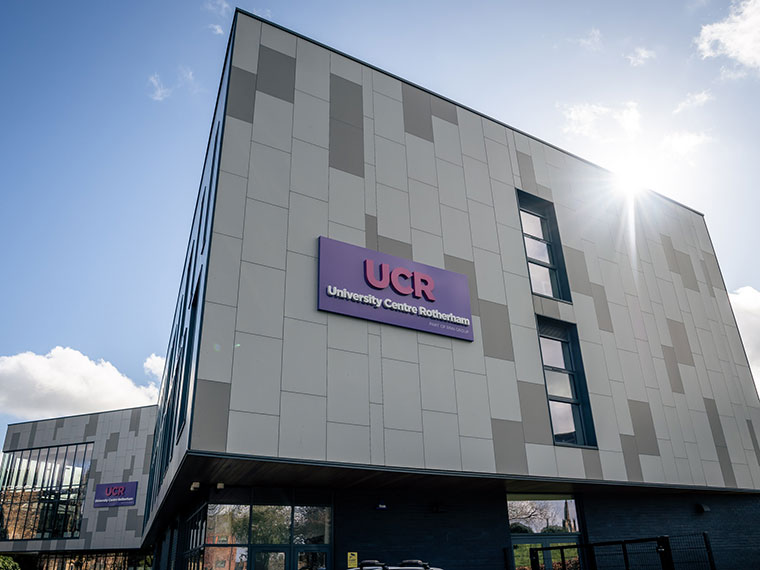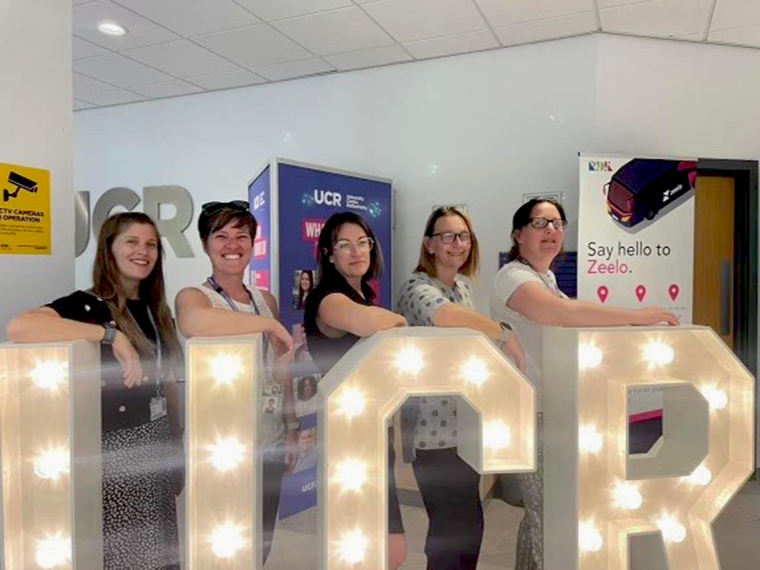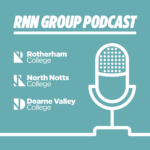Spotlight on… Higher Education Courses
Are you a problem-solver and a good listener with buckets of patience and a desire to inspire others? Then your dream career could lie in education.
You might be a graduate interested in teaching, are looking to change careers, or an experienced educator who wants to climb the career ladder. But what qualifications do you need to get there?
Whether you’re just thinking about it or ready to apply, read on to find out how University Centre Rotherham could help you work towards shaping the education of tomorrow.

What is a career in education?
If you think back to your own education, there’s probably one teacher that sticks in your mind for their endless encouragement and brilliance. They could have been a primary school teacher whose kindness changed your childhood, or a college tutor who made you believe in your career goals.
Working in education is one of the most rewarding and fulfilling careers. Your skills could motivate and champion the students of tomorrow and give young people a chance of bettering themselves.
That might be working in the classroom as a teacher or teaching assistant at a school, college or early years setting, or advancing to become a head of year, curriculum leader, or part of the senior management team.
But there are also lots of non-teaching roles within education that we’ll look at later on.
Where could I work?
First of all, you need to think about what sort of students you want to work with. Children? Teenagers? Adults? People with special educational needs? Young people who are disengaged from mainstream school? Prisoners or young offenders?
As well as traditional education settings like schools and colleges, some our past learners have gone on to work in training roles within public services or for private companies.
The education setting you want to work in will determine what qualification you will need.
Do I need QTS?
You only need qualified teacher status (QTS) if you plan to work in a primary or secondary school.
The teaching qualifications we offer at University Centre Rotherham are for lifelong learning. This means that, once you graduate, you will be able to work in a sixth form or further education college teaching young people over 16, in a SEN setting with students over 14, or deliver community or adult learning courses.
Here at University Centre Rotherham, graduates from our education department have gone on to teach in various settings. Some have become school or college teachers, others have progressed to become heads of year, and some are working in specialist SEN settings.
What if I don’t want to be a teacher?
Teachers might be the figurehead of the classroom. But there are so many non-teaching roles available for people who prefer to work behind the scenes or support students with their pastoral needs.
Just some supportive job roles include teaching assistants and higher level TAs, SEN coordinators, curriculum leaders, and senior management staff.
There are also plenty of administrative roles within the education sector, such as office managers, school finance officers, employability advisors, and student support staff.
You could also aim for learning and development roles within the public or private sector, creating training frameworks for companies working in the health, manufacturing or public services industries.
Many of our graduates have gone into non-teaching roles within areas like safeguarding or training roles within the NHS.
What about my current job? Will I have time to study?
Returning to education can be a daunting thought. But your age and background shouldn’t stop you from applying. Mature students have life experience that is of great value to the education industry.
Most of our education courses are delivered part-time to suit those already in paid employment or with other commitments.
Also, studying a Higher Education (HE) course can increase your social mobility and salary expectation. We have had learners who have gone from working 16 hours a week as a lunchtime supervisor to gaining full-time employment after completing their higher education course.

Pictured above is our class of 2024 Foundation Degree in Learning Support graduates. Many had studied with us from levels 2 and 3 at Rotherham College and progressed onto the foundation degree at University Centre Rotherham.
Individually, they’ve achieved significant career advancements, progressed onto the BA Hons course, and even run marathons, all while working, raising families and caring for loved ones. Their dedication is truly remarkable.
What education courses could I study at University Centre Rotherham?
At University Centre Rotherham, our education department has many different Higher Education pathways. It’s the biggest department due to the sheer number of programmes across levels 4 to 7.
Though it’s large in size, the education department is a real close-knit community – a big ethos of ours here at University Centre Rotherham. You’re not just another number to us. Our course leaders take the time to get to know each learner on an individual basis to offer them any additional support they might need.
You don’t need to have a degree or be working in education to apply. We have a diverse range of learners, many of whom have returned to education as mature students (over 21) to either change their career direction or upskill and advance their career.
So, let’s look at the options.
Train to teach
Already have a degree but no teaching experience?
If you want to teach and already have a bachelor’s degree, then the PGCE course is ideal for you.
This is a post-graduate qualification, validated by University of Huddersfield, that takes either one year for the full-time option, or two years if you choose to study part-time. The part-time course is taught in the evenings.
You can have done a bachelor’s degree in any subject, but it helps if it’s relevant to the subject you want to teach. You will also need GCSE maths and English at a minimum of grade 4/C.
Much of the course is focused on practical teaching, giving you the skills needed for the initial teaching practice. As part of the course, you’ll need to do 250 hours of paid or voluntary work experience within an education setting as a teacher or trainer.
Don’t have a degree or any teaching experience?
If you’d love to become a teacher but have been put off because you don’t have a degree, then the Certificate in Education (CertEd) is a route to consider.
Similar to the PGCE, the CertEd course is also validated by the University of Huddersfield and is offered on a full-time or part-time basis. The part-time course is taught in the evenings.
Both the CertEd and PGCE courses are taught together as one group. Assignments may be different, but the course input for both are similar, covering the initial teaching practice that you will need.
You don’t need any experience of working in an education setting, so it’s great for anyone considering changing careers. You will need to do 250 hours of paid or voluntary work experience within an education setting.
While you don’t need a degree, you should be have a HNC (level 4) or NVQ Level 3 or 4. You’ll also need maths and English at level 2.
Professional development
Working in education in a support role?
If you are already working in education but would like to advance in your career, then the foundation degree in learning support could be a great option for you.
It’s a level 5 qualification aimed at those in a support role, such as teaching assistants or learning mentors. You can work in any type of setting, whether that’s a primary school, secondary school or further education college.
It’s a great CPD route for schools to consider for their staff. You’ll develop your knowledge in things like safeguarding, managing behaviour, digital technologies for learning, and working with professionals and families.
The foundation degree in learning support at University Centre Rotherham is done on a part-time basis over three years, with lectures taking place in the evening.
It’s validated by the University of Hull and is equivalent to two-years of an undergraduate degree (level 5). After you graduate, you’ll have the option to do the top-up BA in Education and Professional Development to achieve the full bachelor’s degree (level 6).
Looking to upskill?
For those looking to take the next steps in their education career, we offer both a bachelor’s degree and a master’s degree in education and professional development.
These flexible programmes are aimed at experienced educators and education professionals who want additional knowledge and skills in core areas like critical reflection, policy and practice, and research and academic scholarship.
You might be interested in new roles with greater responsibility, or want to improve your teaching and learning skills further.
Both the BA and MA courses are offered on a part-time basis and take two years to complete.
The bachelor’s degree lectures are taught on Saturdays and the masters takes place during the evenings, with flexible tutorials throughout the month. Both are validated by the University of Hull.
As the BA is a top-up course, it’s aimed at learners who have done a level 5 qualification, such as the CertEd or foundation degree. You’ll also need to have worked in a teaching, training or learning support role for two years.
For the MA, you’ll need a first or second class undergraduate degree in an appropriate subject area.
Real graduate stories
Beth Hall, Education Lecturer at University Centre Rotherham
Beth works part-time as a lecturer within the education department. She completed her PGCE at University Centre Rotherham in the summer of 2024.
Alongside her teaching role, she also works as a Higher Education achievement coach for RNN Group. It was after starting this role four years ago that she considered taking the teaching route.
“I’d never thought about being a teacher. I did my degree in sociology and criminology and wanted to go into the probation service. But after doing some voluntary work I wasn’t sure it would be for me. I’d always liked working with people, especially underprivileged people, and starting looking at support roles within education which is how I ended up in the HE achievement coach role.”
As part of her CPD as an RNN staff member, Beth was encouraged to do a level 3 award in education and training, a 12-week course for adult learners that gave her a taste for teaching.
“As part of the course I had to do a 30-minute micro-teaching session. That was such a massive thing for me as I’d never thought of myself as a confident person. I know that I’m good one-on-one with people but I didn’t think I’d be able to stand up and teach in that way. I remember being really proud of myself afterwards.”
After finishing the level 3 award, Beth decided to enrol on the part-time PGCE course at University Centre Rotherham. As part of the course, she did a work placement within the department, teaching on the foundation degree course. As her lectures were in the evenings, she was able to continue working full-time in her role at RNN Group.
“I’m lucky to have studied somewhere where learning was so easily accessible. Studying locally made a huge difference for me. If I’d have gone elsewhere, would I have been able to get there in time after work? Or would I have had to use my annual leave to do a daytime course?
“I also had lots of encouragement from the curriculum team at University Centre Rotherham. Maybe I’d have got there on my own but I needed someone to plant that seed and believe in my ability to become a teacher.”












